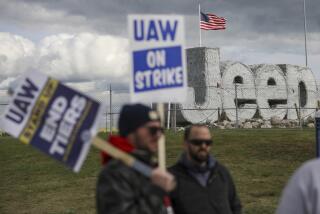IPI Says Bank Is to Blame for Abrupt Plant Closure : Factory: Chase Manhattan denies accusation. Some of the 190 laid-off workers consider lawsuit.
- Share via
SANTA ANA — The Singapore-based owner of Interconnection Products Inc., a Santa Ana company that abruptly shut its factory earlier this week and laid off 190 employees, is trading accusations with its New York banker over who is to blame for the closing.
Meanwhile, some ex-employees of IPI, a manufacturer of electronic-connector products, said they are considering possible legal action for what they claim were possible violations of a federal plant-closing law. The law requires 60 days notice for a shutdown involving layoffs of more than 100 employees.
Officials at Wearnes Technology, the Singapore company that managed IPI, said the company had no choice in shutting down the plant after talks with Chase Manhattan Bank over a loan agreement fell through and the bank provided virtually no notice that it was proceeding with foreclosure.
However, Amy Sugal, a Chase spokeswoman in New York, disputed Wearnes’ version of the negotiations Wednesday. “We were engaged in negotiations with the company and they acted preemptively.” She declined to elaborate.
Chris Young, operations manager at Wearnes Technology, said in a phone interview Tuesday that talks with Chase over terms of a $9-million loan were unsuccessful.
He said Wearnes, which purchased a 28% stake in IPI in March, 1990, had inherited a “burdensome” debt arrangement with Chase. Wearnes attempted to renegotiate the debt, but the bank was “feet-dragging.”
“We tried to get relief from Chase,” Young said. “We tried to turn the company around. The losses continued, and it was more than we could accept.”
IPI was losing about $600,000 a month, he said, adding that Wearnes closed the plant and removed equipment last weekend. Chase, he said, had refused to provide any more financing and said it planned to foreclose on the property on Monday.
Young also said the company’s legal counsel had determined that advance notice to the employees wasn’t required under the circumstances. In an unsigned letter to employees last Friday, IPI expressed regrets that it couldn’t give earlier notice, which it said would have jeopardized its efforts to obtain financing.
Robert Hines, a former computer systems manager at IPI, said he was talking to employees and lawyers about the possibility of suing the company for violation of the plant-closing law.
“It would appear that they have illegally closed our plant and hidden behind the excuse they were being foreclosed,” Hines said. “They shut us down and said goodby with a very cavalier attitude.”
He estimated that the company owed employees $235,000 in vacation pay, 16 hours of pay for salaried employees, overtime pay for non-salaried employees and 60 days back pay for failure to notify them. He estimated total claims could climb to $1 million.
Some labor law lawyers said that a lawsuit, if filed, could test the legal exceptions to the federal Worker Adjustment and Retraining Notification Act of 1988.
Howard Hay, a labor lawyer in Newport Beach, said the plant-closing law hasn’t faced many legal challenges since its enactment. He said there are “gray areas” that allow employers to seek exemptions.
“I think this could be a test case of the exceptions to the plant-closing law,” said Bruce May, a labor lawyer in Newport Beach.
May said Wearnes may be relying on a provision of the law that provides exemptions if a plant owner’s efforts to obtain financing or get new business would be jeopardized by early notification.
Whether Chase Manhattan knew about the financial deterioration of IPI or whether Wearnes knew about the possibility of a foreclosure, usually a lengthy process, would be key questions in the case, Hay said.
The law also includes exceptions for unforeseeable business circumstances, such as the loss of a major customer, a dramatic and unexpected economic downturn, a labor strike or a government-ordered closing.
However, ex-employees claimed Wearnes made preparations to shut the plant days before the actual closing and that Chase Manhattan was aware of the company’s financial problems.
“We were losing money and that was no shock,” Hines said. “The way they closed it was a shock.”
May said the law states that courts should interpret the closing law so that exceptions are “narrowly construed,” or not used as loopholes to avoid notification.
The law places the burden of proof on the employer in showing that notification of less than 60 days was appropriate.
It also requires that the plant’s owner exhaust other possible sources of financing outside the specific plant, such as its other subsidiaries, if it relies on the financing exception to worker notification.
Exceptions to Notification Law
Here are key exceptions to the Worker Adjustment and Retraining Notification Act.
* Threat to business: An employer may shut down a plant before the conclusion of the 60-day period if, as of the time that notice would have been required, the employer was actively seeking capital or business which would have enabled a postponement of the shutdown, and the employer believed that giving notice would have made it impossible to obtain.
* Unforeseeable circumstances: An employer may order a plant closing before the conclusion of the 60-day period if the closing is caused by business circumstances that were not reasonably foreseeable as of the time that notice would have been required.
More to Read
Inside the business of entertainment
The Wide Shot brings you news, analysis and insights on everything from streaming wars to production — and what it all means for the future.
You may occasionally receive promotional content from the Los Angeles Times.










